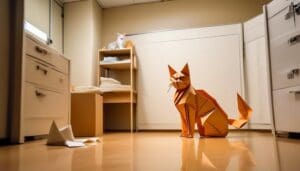It’s often said that with age comes wisdom, but when it comes to your aging cat, it may also bring the challenge of incontinence. You’re not alone in this journey; many pet owners face similar struggles as their beloved cats enter their golden years. Be patient and try to understand as you deal with this sensitive issue directly.
From creating a comfortable living environment to addressing medical needs, there are effective strategies to manage your cat’s incontinence while maintaining their dignity. To support your cat, let’s explore five compassionate tips that cater to their changing needs.
As you learn to adapt to this new normal, remember that every small step you take can greatly enhance the quality of life for your cherished older cat.
Key Takeaways
- Proper diagnosis from a vet is crucial for addressing incontinence in older cats.
- Modifying the home environment by increasing the number of litter boxes and using washable blankets or cat beds can help accommodate incontinent cats.
- Maintaining proper hygiene through regular bathing, using washable bedding, and addressing any discomfort or skin issues is important.
- Adjusting the cat’s diet and nutrition, with guidance from a vet, can help improve urinary health in incontinent cats.
Identify Underlying Causes
Understanding your senior cat’s incontinence starts with identifying the underlying health issues that may be causing it. It’s a delicate situation that requires your empathy and patience. Remember, your cat isn’t deliberately being difficult; they’re experiencing a challenge that’s beyond their control.
The causes of cat incontinence can vary, but common culprits include urinary tract infections and lower urinary tract disease. These conditions aren’t only uncomfortable for your cat but can also lead to accidents around the home. Urinary tract infections, in particular, can cause your cat to feel an urgent need to urinate, leading to leakage or inappropriate urination if they can’t make it to the litter box in time.
Lower urinary tract disease, which encompasses a range of issues affecting your cat’s bladder and urethra, can also cause incontinence. It’s crucial to get a proper diagnosis from your vet, as each condition may require a different approach to care and management.
Your compassion and action can make a world of difference for your senior cat. By understanding the potential health issues, you’re taking the first step towards providing the care and support they need during this vulnerable time.
Modify the Home Environment
To help your older cat stay healthy, add more litter boxes in your home. Put them in places that are quiet and easy to get to so your cat doesn’t get stressed. Make sure to clean these boxes often to keep your cat happy.
Use washable blankets or cat beds for their favorite lounging spots. Not only will this keep your cat cozy, but it will also protect your furniture from any accidents. For added protection, you might want to place pee pads on furniture or window sills where your cat loves to sit.
Here’s a quick guide to help you modify your home environment for your senior cat:
| Modification | Purpose |
|---|---|
| Additional litter boxes | Easy access for frequent use |
| Washable blankets | Comfort and cleanliness |
| Pee pads on furniture | Protect surfaces from accidents |
| Accessible cat beds | Ensure comfort in favorite spots |
| Cat-free rooms | Protect belongings and reduce cleaning |
Maintain Proper Hygiene
Maintaining proper hygiene for your aging cat not only ensures their comfort but also prevents potential health issues related to incontinence. Regularly bathing your cat with a gentle, cat-safe cleaner can help prevent skin irritation and keep them feeling fresh. It’s a delicate task, but your tender care can make all the difference in their wellbeing.
Use washable cat beds and blankets to create a clean, cozy resting place for your cat. This practice makes it easier for you to keep their environment hygienic and comfortable. When accidents happen, having these washable items on hand means you can quickly swap them out, reducing any distress for your pet.
Keep an eye out for any signs of discomfort or skin issues. If you notice anything concerning, don’t hesitate to reach out to your vet. Prompt care can alleviate your cat’s discomfort and prevent minor issues from becoming more serious.
Consider rearranging your living space to keep certain areas cat-free. This can protect your furniture from accidents and make it simpler for you to maintain proper hygiene throughout your home. Your compassionate care provides your senior cat with the dignity and comfort they deserve in their golden years.
Adjust Diet and Nutrition
Consulting your veterinarian can help tailor your older cat’s diet to better manage incontinence, ensuring they receive the right balance of nutrients for their urinary health. It’s important to understand that as cats age, their dietary needs can change, and the right nutrition can support a healthy urinary tract and bladder.
Specialized diets are formulated to help cats who urinate more frequently, and these can be particularly beneficial. Your vet might recommend a diet that is lower in magnesium and phosphorus, which can support a healthy urinary system. Here’s a quick guide on what to consider:
| Aspect | Consideration |
|---|---|
| Hydration | Ensure constant access to fresh water |
| Specialized Diet | Formulated to support urinary health |
| Supplements | May be recommended by your vet |
| Monitoring | Keep a close eye on dietary responses and adjust |
Make sure your beloved cat always has access to fresh water to promote hydration and support urinary health. Monitoring their response to dietary changes is key, and adjustments may be needed to find the perfect balance for their individual needs. Your compassion and attentive care can make a significant difference in the quality of their golden years.
Explore Medical Interventions
While adjusting your cat’s diet is a crucial step, it’s also important to consider medical interventions that can further aid in managing incontinence in your senior cats. These interventions can be tailored to address the specific causes of urinary incontinence, ensuring your cat remains comfortable and as healthy as possible.
Here are some options you might discuss with your veterinarian:
- Medications for Sphincter and Bladder Muscle Control: Medications such as phenylpropanolamine or prazosin can strengthen the sphincter, while bethanechol may help with bladder muscle control. These can be critical in restoring continence.
- Diagnostic Testing: A thorough workup including urinalysis, blood count, chemistry panel, and imaging like X-rays or ultrasound can pinpoint the underlying cause of incontinence, whether it’s due to a spinal cord issue or another condition.
- Supportive Care and Alternative Therapies: Acupuncture has been known to help with spinal cord diseases, and manual bladder expression can be learned to assist your cat in emptying their bladder. Protect their skin with barrier ointments to prevent irritation from leaks.
Frequently Asked Questions
How Do You Take Care of an Incontinent Cat?
Become a superhero for your pet by adding more litter boxes and comfortable beds. Consult your veterinarian for advice, clean any messes with a vinegar solution, and carefully monitor your furry friend.
How Can I Stop My Elderly Cat From Peeing Everywhere?
You should see a vet for your elderly cat’s issues. They might suggest drugs or specific diets to stop your cat from urinating everywhere.
Why Is My 16 Year Old Cat Peeing Everywhere?
If your 16-year-old cat is urinating all over the place, it might be due to medical problems or because of its age. It’s important to see a veterinarian to get advice specific to your pet.
What to Do With a Cat That Keeps Peeing in the House?
If your cat’s peeing in the house, consult with your vet to address underlying health issues. You’ll want to increase litter boxes and use protective coverings to manage this challenging situation.




